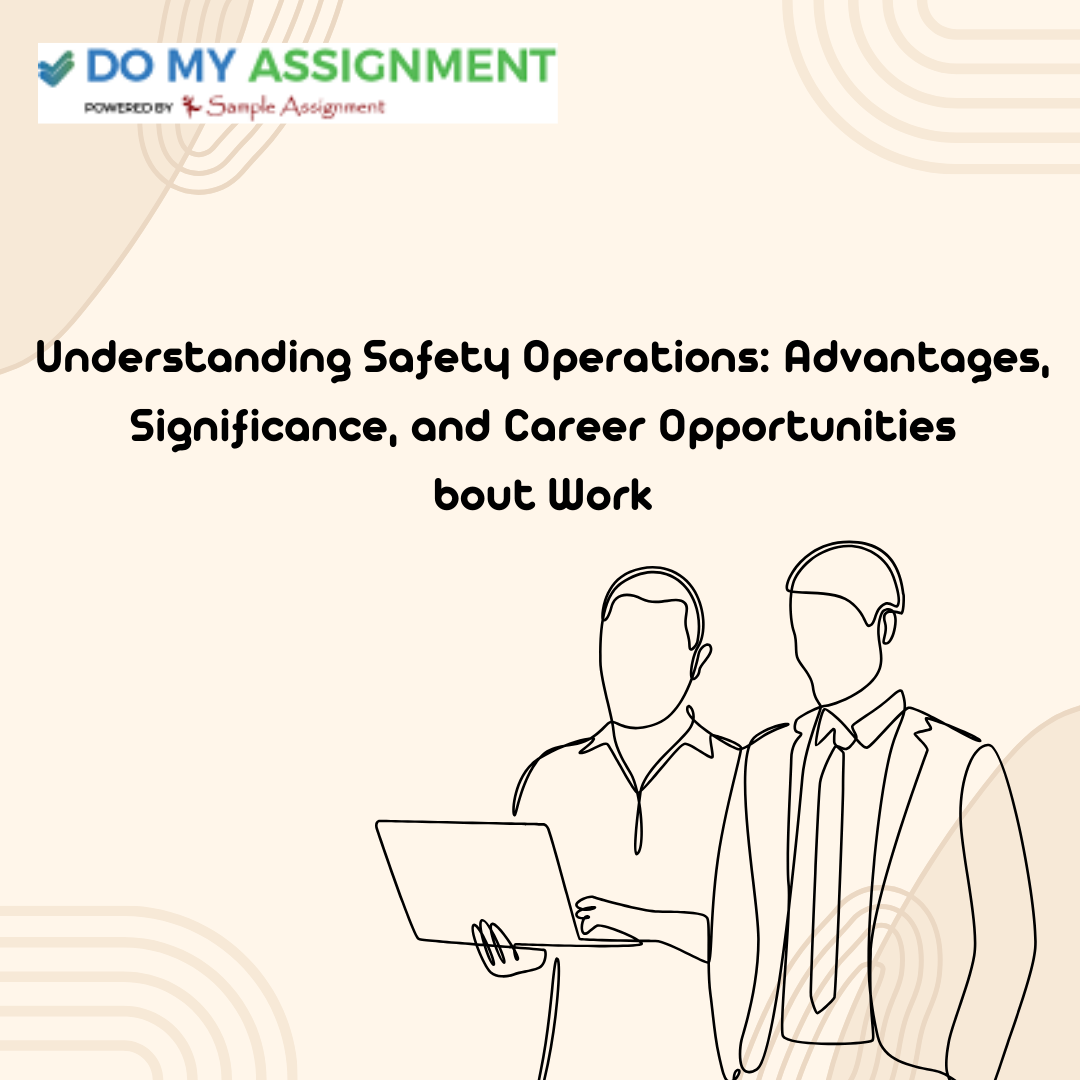Safety operation is a critical component of various industries, ensuring the well-being of employees, compliance with regulations, and the prevention of accidents and incidents. In this comprehensive guide, the article will explore the concept of safety operation, its advantages, its significance in different fields, and the career opportunities it offers. Additionally, this article will discuss the role of Assignment help in facilitating the learning of safety operation.
Safety operations encompass a set of practices and measures aimed at ensuring the safety and well-being of individuals in various environments. These environments can range from workplaces to public spaces, and the principles of safety operation is applied across industries. The ultimate goal is to prevent accidents, injuries, and incidents that may pose a threat to human life, property, or the environment.
The Importance of Safety Operations
Safety operations are essential for multiple reasons, including legal compliance, ethical responsibilities, and the protection of individuals and assets. They contribute to the overall well-being of employees, support risk management efforts, and enhance the reputation of organizations. Learning about safety operations is crucial for professionals in numerous fields, as it equips them with the knowledge and skills needed to create safe and secure environments.
Advantages of Safety Operations
Safety operations are a critical aspect of various industries and organizations, encompassing practices and measures aimed at safeguarding people, property, and the environment. Understanding the advantages of safety operations is essential for creating a secure and compliant working environment.
Employee Safety and Well-being
One of the primary advantages of safety operations is the protection of employees and the promotion of their well-being. A safe work environment reduces the risk of injuries and accidents, leading to a healthier and more motivated workforce.
Compliance with Regulations
Safety operations ensure that organizations adhere to relevant safety regulations and standards. Compliance not only prevents legal issues but also fosters a culture of responsibility and accountability.
Risk Mitigation
By identifying potential hazards and taking steps to mitigate risks, safety operations help organizations avoid costly incidents and damage to their reputation. Risk management is a proactive approach to maintaining stability and sustainability.
Enhanced Reputation
Organizations known for their commitment to safety operations enjoy an enhanced reputation. This can attract clients, customers, and partners who value safety and responsible practices.
Significance of Learning Safety Operations
Safety operations, an integral part of various industries and organizations, play a vital role in safeguarding people, property, and the environment. Understanding the significance of learning safety operations is crucial for maintaining a secure and compliant working environment.
As organizations and industries continue to prioritize safety, the importance of understanding and implementing safety operations remains paramount. By fostering a culture of safety and well-being, organizations can create responsible and secure environments that benefit everyone. The ongoing relevance of safety operations underscores their significance in today’s world.
Industry-specific Applications
Safety operations are not one-size-fits-all. Different industries have unique safety requirements. Learning safety operations involves understanding these industry-specific applications and tailoring safety measures accordingly.
Legal and Ethical Considerations
A significant aspect of safety operations is understanding the legal and ethical responsibilities related to safety. This knowledge ensures that professionals make decisions that prioritize safety, ethics, and compliance.
Emergency Preparedness
Safety operations include planning for emergencies and disasters. Learning this aspect of safety operations equips individuals and organizations to respond effectively in crisis situations.
Continuous Improvement
Safety operations are not static; they require continuous improvement. Learning how to assess and enhance safety measures is an ongoing process that contributes to the long-term success of organizations.
Career Opportunities in Safety Operations
Career opportunities in safety operations are expanding as organizations prioritize the well-being of their employees, assets, and the environment. Professionals in this field play a critical role in creating and maintaining secure work environments while ensuring compliance with safety regulations.
Occupational Health and Safety (OHS) Roles
Professionals specializing in OHS play a critical role in creating safe work environments. They ensure compliance with safety regulations, conduct risk assessments, and develop safety programs.
Environmental Health and Safety (EHS) Positions
EHS professionals focus on environmental safety, including issues related to pollution, waste management, and sustainability. They work to reduce the environmental impact of organizations.
Safety Consulting and Auditing
This generally provides expert guidance to organizations, helping them improve safety operations and comply with regulations.
Safety Management
Safety managers oversee safety operations within organizations. They develop safety policies, train employees, and monitor safety compliance.
Role of Assignment Help in Learning Safety Operations
Learning safety operations is quite difficult for students. Here Assignment help services can play a significant role in supporting students as they learn about safety operations. These services offer the following benefits:
Subject Expertise
Assignment help providers often have subject matter experts in the field of safety operations. They can offer valuable insights, guidance, and clarification on complex topics.
Skill Development
Safety operations require specific skills, such as risk assessment and emergency planning. Assignment help can aid students in developing these essential skills through practical assignments.
Compliance with Academic Standards
These services ensure that students’ assignments meet academic standards and guidelines. This includes proper citation, formatting, and adherence to assignment instructions.
Time Management
Safety operations coursework can be demanding. Services providers like “Do My Assignment” assist students in managing their time effectively, ensuring that they can meet deadlines and balance their academic responsibilities.
Conclusion
Safety operations are a cornerstone of maintaining a secure and responsible society. Learning about safety operations equips individuals with the knowledge and skills needed to create safe environments and prevent accidents and incidents. It is a field that offers numerous career opportunities, from OHS roles to safety consulting.
Assignment helps services contribute to the learning of safety operations by providing subject expertise, skill development, compliance with academic standards, and assistance with time management. As the world continues to prioritize safety and well-being, the significance of safety operations in various fields remains paramount. Learning about safety operations is not just a career choice; it’s a commitment to creating a safer and more secure future. So, if you are one who wants to have in-depth knowledge about this read the above-listed information to boost your knowledge.




